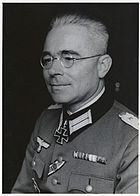Joachim von Siegroth (25 December 1896 – 2 May 1945) was a general in the Wehrmacht of Nazi Germany during World War II. He was a recipient of the Knight's Cross of the Iron Cross. Siegroth was listed as missing in action during the Battle of Halbe in May 1945.
Joachim von Siegroth | |
|---|---|
 | |
| Born | 25 December 1896 |
| Died | 2 May 1945 (aged 48) Missing in Action during Battle of Halbe |
| Allegiance | |
| Service | Army |
| Years of service | 1914–19 1935–45 |
| Rank | Generalmajor |
| Commands | 712th Infantry Division |
| Battles / wars | World War I
World War II |
| Awards | Knight's Cross of the Iron Cross |
| Other work | Police officer |
Awards and decorations
edit- Iron Cross (1914) 2nd Class (9 October 1914)[1]
- Clasp to the Iron Cross (1939) 2nd Class (12 June 1940) & 1st Class (22 June 1940)[1]
- Honour Roll Clasp of the Army (19 December 1941)[1]
- German Cross in Gold on 19 December 1941 as Oberstleutnant in Infanterie-Regiment 255[2]
- Knight's Cross of the Iron Cross with Oak Leaves
Towards the end of the war, Siegroth was nominated for the Oak Leaves. The Heerespersonalamt (HPA—Army Staff Office) received the nomination for the Oak Leaves from the commander-in-chief of the 9. Armee Theodor Busse via teleprinter message on 21 April 1945 announcing that a detailed statement with explanations will follow. This nomination went to the chief of the HPA in Berlin and to the Army Group Vistula. Major Joachim Domaschk noted on 28 April: "Waiting for announced statement!" The nomination list of the higher grade of the Knight's Cross of the Iron Cross with Oak Leaves notes the entry date of 19 March 1945. This is the date when the nomination was sent. An almost unreadable comment states "Waiting". According to Fellgiebel a note claims "service proposal regarding immediate presentation pending".[4] Scherzer does not confirm this entry but states that a comment "Waiting for announced statement" is noted instead. No further comments indicate that the nomination was further processed. According to the Association of Knight's Cross Recipients (AKCR) the award was presented in accordance with the Dönitz-decree. This is illegal according to the Deutsche Dienststelle and lacks legal justification.[5]
See also
editReferences
editCitations
edit- ^ a b c Thomas 1998, p. 320.
- ^ Patzwall & Scherzer 2001, p. 444.
- ^ Fellgiebel 2000, p. 325.
- ^ Fellgiebel 2000, p. 89.
- ^ Scherzer 2007, p. 175.
Bibliography
edit- Fellgiebel, Walther-Peer (2000) [First published 1986]. Die Träger des Ritterkreuzes des Eisernen Kreuzes 1939–1945 — Die Inhaber der höchsten Auszeichnung des Zweiten Weltkrieges aller Wehrmachtteile [The Bearers of the Knight's Cross of the Iron Cross 1939–1945 — The Owners of the Highest Award of the Second World War of all Wehrmacht Branches] (in German). Friedberg, Germany: Podzun-Pallas. ISBN 978-3-7909-0284-6.
- Patzwall, Klaus D.; Scherzer, Veit (2001). Das Deutsche Kreuz 1941 – 1945 Geschichte und Inhaber Band II [The German Cross 1941 – 1945 History and Recipients Volume 2] (in German). Norderstedt, Germany: Verlag Klaus D. Patzwall. ISBN 978-3-931533-45-8.
- Scherzer, Veit (2007). Die Ritterkreuzträger 1939–1945 Die Inhaber des Ritterkreuzes des Eisernen Kreuzes 1939 von Heer, Luftwaffe, Kriegsmarine, Waffen-SS, Volkssturm sowie mit Deutschland verbündeter Streitkräfte nach den Unterlagen des Bundesarchives [The Knight's Cross Bearers 1939–1945 The Holders of the Knight's Cross of the Iron Cross 1939 by Army, Air Force, Navy, Waffen-SS, Volkssturm and Allied Forces with Germany According to the Documents of the Federal Archives] (in German). Jena, Germany: Scherzers Militaer-Verlag. ISBN 978-3-938845-17-2.
- Thomas, Franz (1998). Die Eichenlaubträger 1939–1945 Band 2: L–Z [The Oak Leaves Bearers 1939–1945 Volume 2: L–Z] (in German). Osnabrück, Germany: Biblio-Verlag. ISBN 978-3-7648-2300-9.